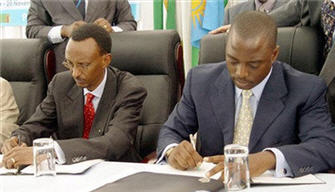
The two presidents met for an hour on Sunday behind closed doors on the sidelines of the 19th session of the African Union Summit in Addis-Ababa, in Ethiopia.
The pact was signed in Addis-Ababa on Thursday by foreign affairs ministers and defense ministers from the member states of the International Conference on the Great Lakes Region (ICGLR). It calls for the “ICGLR to work with the AU and the UN on an immediate establishment of a neutral International Force to eradicate the M23, FDLR and all other Negative Forces in Eastern DRC and patrol and secure the Border Zones.”
Outgoing AU commission chairman Jean Ping told leaders at the opening of the summit that the organization was ready to contribute to such a force in eastern Congo. Leaders at the summit elected South Africa's Nkosazana Dlamini-Zuma as the new AU chair on Sunday.
The Congolese government, rights groups and a United Nations Group of Experts report have accused Rwandan authorities of supplying men, ammunitions and weapons to the M23 rebels led by Bosco Ntaganda, who is wanted by the International Criminal Court on war crimes charges.
Rwandan authorities have come under increased pressure from foreign partners, including the United States, to stop supporting the M23 rebels.
The signing of the pact may have sealed the fate of warlord Bosco Ntaganda. In 2009, Congolese and Rwandan authorities struck a deal that led to the arrest of warlord Laurent Nkunda, who was later replaced by his then deputy, Bosco Ntaganda, as commander-in-chief of the rebel CNDP.
This time around, Rwanda cannot afford to just put Ntaganda “under house arrest” as it did with Nkunda. Unlike Ntaganda, Nkunda has inexplicably never been charged by the ICC for the numerous war crimes committed by the CNDP. It is however unlikely that Ntaganda will ever be handed over to the ICC. He knows too much. It is more likely that the man nicknamed “The Terminator” by his victims will sooner or later be terminated himself by his backers.
Related articles
- • DRC and Rwanda Sign Declaration of Principles for Peace in Eastern Congo (April 25, 2025)
- • European Union Sanctions Rwanda and M23 Officials over Congo Conflict (March 17, 2025)
- • Canada and Germany Impose Sanctions on Rwanda for Supporting M23 Rebels (March 4, 2025)
- • UK Suspends Financial Aid to Rwanda Over M23 Rebellion (February 25, 2025)
- • European Union Suspends Defence Consultations with Rwanda (February 24, 2025)
- • Tshisekedi Announces Government of National Unity and Calls for Unity Against M23 Rebels (February 23, 2025)
- • UN Security Council Calls on Rwanda to Stop Supporting M23 Rebels in DR Congo (February 22, 2025)
- • US Sanctions Rwanda's Minister James Kabarebe for Central Role in DR Congo Conflict (February 20, 2025)
- • Rwanda-Backed M23 Rebels Summarily Executed Children in Bukavu, UN Reports (February 19, 2025)
- • DR Congo Citizens Head to Polls to Elect President, Members of Parliament (December 20, 2023)
- • Ebola outbreak declared an international Public Health Emergency (July 17, 2019)
- • Felix Tshisekedi Sworn In as DR Congo President (January 24, 2019)
- • Constitutional Court Declares Tshisekedi Winner of Presidential Election (January 19, 2019)
- • Felix Tshisekedi Vows to Be the President of All Congolese (January 10, 2019)
- • Felix Tshisekedi Elected DR Congo President (January 10, 2019)
- • DR Congo Delays Results of December Election (January 6, 2019)
- • Jean-Pierre Bemba named MLC presidential candidate (July 13, 2018)
- • Botswana Urges Joseph Kabila to Step Down (February 26, 2018)
- • No elections in DR Congo in December without electronic voting machines: INEC (February 13, 2018)
- • US Warns DR Congo Against Electronic Voting for Delayed Election (February 12, 2018)
- • Felix Tshisekedi accuses INEC of illegally prolonging Kabila's mandate (October 24, 2017)
- • DRC Seeks Arrest of Presidential Candidate Moise Katumbi (May 19, 2016)
- • Papa Wemba Is Buried in Kinshasa (May 4, 2016)
- • Papa Wemba Awarded Highest National Honor as Thousands Pay Tribute (May 2, 2016)
- • Peacekeepers, Congo Army to Resume Joint Fight Against Rwandan Rebels (January 28, 2016)
- • Political tensions 'running high' in DR Congo ahead of 2016 elections (October 7, 2015)
- • Rights Groups: DR Congo Must Free Pro-democracy Activists (April 13, 2015)
- • DRC Army Putting Pressure on FDLR (April 1, 2015)
- • Police Open Fire on Crowd Protesting Election Law Change (January 19, 2015)
- • ICC Confirms 14-Year Sentence Against Thomas Lubanga (December 1, 2014)







